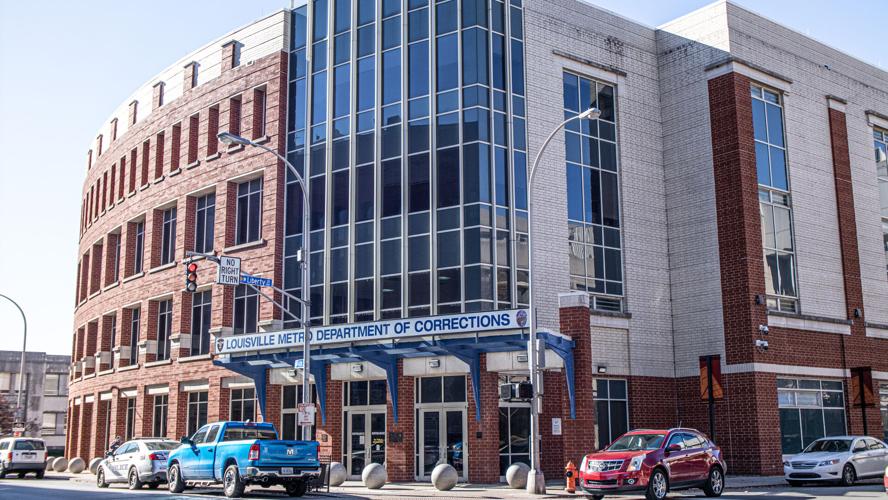LOUISVILLE, Ky. (WDRB) -- From safety concerns and staffing shortages, to rundown facilities and sexual harassment, Metro Council members are seeing the results of an investigation into ongoing problems at Louisville's jail.
A string of deaths inside the Louisville Metro Department of Corrections led to multiple investigations being launched last year. Metro Council hired David Beyer, a retired FBI agent, to conduct a report of his own as some councilmembers were skeptical of the consultant hired by former Mayor Greg Fischer's administration to investigate issues at the jail.
Beyer released the final report from his investigation Wednesday afternoon, which revealed several issues inside jail in downtown Louisville, and gave his recommendations to councilmembers.
But there wasn't much the investigation found that came as a surprise to the people who have been waiting for its results.
"One of the things that we've heard about is securing all of the entrances and making sure that, you know, everything that comes into the facilities (are) screened," said Metro Council President Markus Winkler, D-17. "I think having the right leadership in place is a critical part of that."
Metro Corrections Director Jerry Collins was appointed nearly a year ago, starting the job in April 2022 following the departure of former director Dwayne Clark, who retired amid ongoing investigations into the series of deaths in the jail.
Despite the new leadership in place, Metro Council hired Beyer to conduct an audit of the facility and hopefully answer some crucial questions.
Some of the issues Beyer focused on in his audit include: prior leadership, deaths in the jail, the facility itself, a staffing shortage, recruiting and retention, discipline and accountability, training, medical care, security, contraband, policies and procedures, sexual harassment, budget and overtime, morale and employee wellbeing.
"What are the findings related to facilities, access control, management, oversight, and general policies that will inform one from a policy perspective," Winkler asked. "Do we have the right things in place?"
Through his investigation, Beyer conducted over 60 interviews with current and former executive staff, LMDC employees and other jail administrators. He also made five visits to all jail facilities to "assess conditions and procedures," and three visits to the training academy to assess the facility, observe training, and review records and curriculum. He also conducted an "extensive review" of nearly 70 pages of records regarding nine of the 13 deaths in the jail.
One of the main findings of Beyer's investigation involved "shortcomings" with past leadership at the jail.
"Of course they were up against COVID, and civil disobedience in downtown Louisville. Nevertheless, good leadership can overcome that," he said, calling Collins "a great new leader for the organization."
Another big contributor to issues at the jail: a lack of staffing. Beyer said with staff often "bogged down doing so many other things" that they couldn't perform other required duties such as routine observation checks, something he said could have helped prevent some of the deaths in the facility.
"I was astounded at the duties that each corrections officer has during their shift," he said.
Having an understaffed facility, Beyer said, "results in extensive overtime" that is costly and has an "adverse impact" on staff and security.
When reviewing the deaths inside the jail, Beyer said there were common issues in their reports, including: lack of jail space, security cameras not being viewed in real-time, a lack of staffing, failure to perform required observation checks, poor and inconsistent logs and inadequate equipment.
"I truly believe, that most of these incidents could have been prevented had we had a better jail, one that's called a 'direct supervision model,'" he said. "There were many instances where what transpired could have been observed by corrections officers in a direct supervision model."
Beyer noted that since last April, the jail has used Narcan on 69 people. It's a number he said "highlights an issue that we still have that we need to get control of contraband in this facility," which he said is sometimes made worse by the facility itself.
By comparison, Beyer said Lexington's jail, which has between 1,100 and 1,400 inmates, has only seen three overdoses in 23 years. Oldham County's jail, with roughly 400 inmates, has had no suicides or overdoses in 20 years. He said what those jails have in common is that they are what he calls "direct supervision facilities."
Beyer said the state of the current jail facilities in Louisville likely contributed to the deaths by suicide, calling them antiquated, run down and inadequate.
"I think, at a minimum, you need to gut the current facility, but you can't add windows to the basement cells," he said.
He also said the facilities are unhealthy for employees, unhealthy for inmates — especially those with mental health issues — and poorly designed for supervision.
"It's not healthy for the inmates, and, similarly, it's not healthy for our employees," he said. "That impacts recruiting, it impacts retention."
Beyer also noted a lack of windows in the facility, saying all humans, inmates and employees, "deserve to see some sunlight."
"To work in these conditions, no wonder we can't get enough people to work here," he said.
Beyer said the jail is not adequately equipped to help or handle inmates struggling with their mental health.
"We've got mental health patients that are staying in facilities that are not conducive to helping them with their problems," he said.
Of the jail's population, Beyer said 20% have mental health issues.
"I don't think we've improved the quality of life for people who have mental health issues," he said. "One of the inmates told me, he said, 'You know what, if you don't have mental health issues when you get here, you will on the way out,' and I guarantee it."
Beyer said the jail has a medical care program that needs "remediation to include better coordination and communication between medical staff and corrections officers."
He also touched on a culture of sexual harassment in the jail.
"I have interviewed over 60 people, and (in) every interview I asked a question, 'Do you think sexual harassment is a problem here at Corrections?' There wasn't one person that ever said 'No, it's not a problem,'" he said. "I got the answer 'Yes,' and always with the caveat 'But it's just friendly banter. And it's a way that we decompress and destress.' And that's problematic. To have a culture like that."
Beyer cited instances of people pulling out their genitalia and groping women, but noted that it's not a problem amongst all employees, and that there are "so many good employees" at Louisville's jail.
"For somebody to think that they can do that on the job, there's gotta be something wrong either with the recruiting of people, training of people, or the culture that allows something like that to happen," he said.
Beyer said that while Collins is working with others on a new, "more robust" sexual harassment policy, it will be useless unless it is followed and enforced.
He said that since Collins took over, employees he interviewed through his investigation said they have had mandatory sexual harassment training, but that it was only 30 minutes long and did not include role playing or a test.
Beyer called on Collins to "reinforce with all of his employees, from top to bottom, that there is a culture that will change" and not be tolerated.
"To his credit, (there is) so much that Director Collins has done, but there's more to do," he said.
Councilman Anthony Piagentini, R-19, said since Collins' appointment, he's seen immediate changes in his leadership style and the technology he's brought in and implemented but called for more "serious action" following the results of the report.
Councilwoman Donna Purvis, D-5, called the report's findings "sad" and "troubling."
"We, as a body, we were not comfortable with the things that we were learning, but it's just so sad to know that there was leadership there that accepted this behavior, overlooked this behavior, and I hope didn't encourage this culture, but it's very, very troubling to know that this has taken place," Purvis said.
Sgt. Gerald Briles, the lead representative for the union that represents employees at Metro Corrections, said they have been "preaching for years that there are some changes that needed to be made" and that they've been looking forward to the results of Beyer's investigation.
"Because it's going to bring to light some issues and shortcomings that have been there for a while," Briles said. "And it's gonna give us an opportunity to improve."
Since taking over at the jail, Collins has addressed issues like safety, overcrowding and a staffing shortage with a lateral academy, which brings in veteran officers.
"What Director Collins (has) shown is an understanding of even just sort of the basic blocking and tackling of running a jail," said Winkler.
The audit results come on the front end of what will be the start of the city's budget season next month.
Copyright 2023 WDRB Media. All Rights Reserved.














